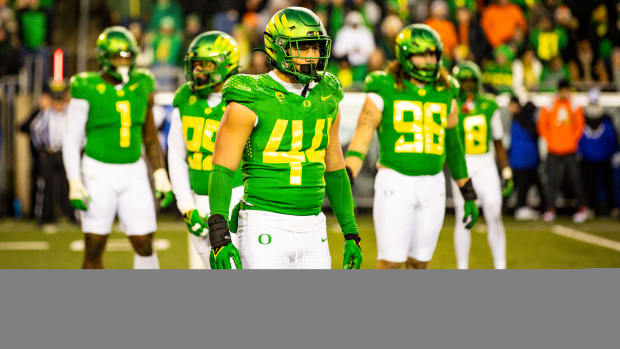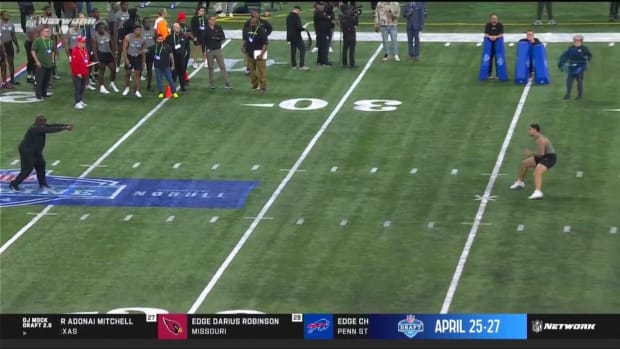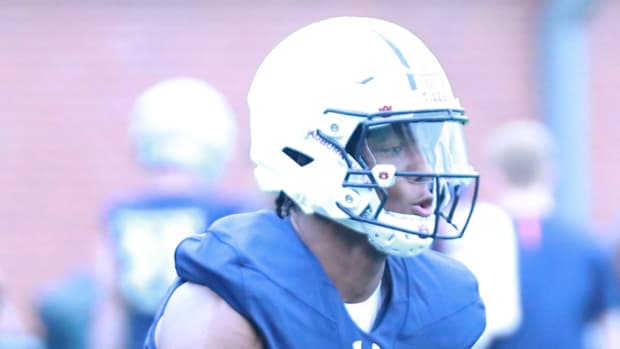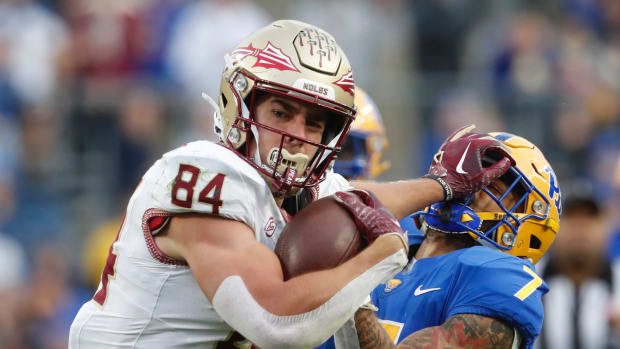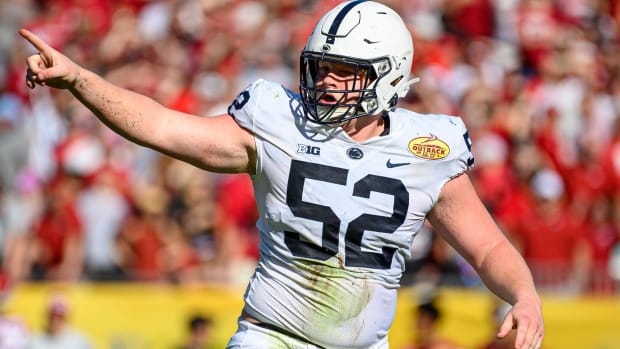Stability amid change: Gary Pinkel and the shaping of Missouri into a perennial SEC threat
COLUMBIA, Mo. — Gary Pinkel couldn't go back to sleep. It was four o'clock on a January morning in 2011, and the meeting that Missouri's football coach had scheduled for later in the day was wearing on him. It didn't seem right, what he was about to do, so Pinkel got out of bed and called Dave Brandon. “Don't get on the plane for the interview," he recalls telling Michigan's then athletic director, who was in the market for a new football coach to replace Rich Rodriguez. And so Brandon stayed in Ann Arbor—and Pinkel stayed in Columbia, where in his 14 seasons he has taken the Tigers from the bottom of the Big 12 to back-to-back SEC East championships.
“I didn't want to start over," Pinkel, 63, says. “I don't like moving around a lot. Maybe that's because I'm so insecure—and I get attached." He chuckles, taking in the decade-and-a-half of memories stacked and hung around his office. Out the window looms Memorial Stadium, in the midst of a years-long renovation project that began in 2012.
When Pinkel hung up the phone with Brandon, the coach had little clue what was in store for him and his team. A few months removed from the potential disintegration of the Big 12, he was just happy that Mizzou was still in a solid conference. When Texas and the Longhorn Network upended the Big 12's equilibrium in the summer of 2010, the Tigers had seemed like the odd men out. But just 10 months after Pinkel turned down the Wolverines, his team was off to the SEC. And in the three-plus seasons since, the Tigers have gone 31–12 and won two division championships.
But 25th-ranked Missouri (3–0) is still fighting to be seen as a legitimate contender among football's good ol' boys, and as 2015 gets rolling there's a sense that the Tigers remain on the periphery of contention in their new conference. (They actually dropped four spots in the AP Poll between Weeks 2 and 4 after a 27–20 win at Arkansas State on Sept. 12 and a 9–6 slugfest victory over UConn last Saturday. Seven 2–1 teams are ranked higher than undefeated Missouri.) But it's that very perceived lack of respect that the Tigers' players say will spur them to their third straight season on top of the SEC East. “When I was younger, I'd always want to see where my team ranked, and now it doesn't matter to me," senior safety Ian Simon says. “It really doesn't matter what everybody else says. That's outside noise."
Mizzou hasn't helped itself by stumbling through a pillow-soft early-season schedule. In the Tigers' opener on Sept. 5, they rolled over FCS Southeast Missouri State 34–3. But in Week 2, they actually trailed the Red Wolves 17–10 at halftime before pulling away in the final 30 minutes. In Week 3, the game was the Huskies' to win until Missouri redshirt sophomore safety Anthony Sherrils intercepted a fake field goal attempt in the final minute of the contest. No matter that the Tigers' defense has been typically great; their moribund offense thus far has been an impediment to a climb in the polls. If Mizzou is serious about impressing, there's a long way to go—and a November nonconference matchup against 23rd-ranked BYU is only a start.
Skepticism of the Tigers has as much to do with their schedule as it does with their division, which in recent years has paled in comparison to its western counterpart. A team from the SEC East hasn't won the conference title game since 2008, when second-ranked Florida beat No. 1 Alabama. Since then, even a close championship game has been a rarity—Georgia lost by four points to the Crimson Tide in '12, and in '13 Missouri hung with Auburn before losing 59–42.
When the AP released its preseason rankings in August, Michael Scherer, a redshirt junior linebacker, got a call from his father, Joe, in St. Louis. The Tigers were ranked No. 24, Joe told his son—24th after a season in which they played in the SEC Championship Game and went 7–1 in conference play. Missouri barely fared better in the Coaches' Poll, which had the Tigers at No. 23. On any other SEC team, the preseason rankings might have been cause for outrage. But Scherer, whose 114 tackles in 2014 were the fourth-most in the SEC, merely laughed. “Oh, I'm surprised we were ranked," he told his dad.
“Around here, we've learned not to care about [a lack of respect], not to worry about it," Scherer says. “We're a very blue-collar program. We just go to work."
*****
Ed Zurga/Getty Images
Since arriving at Missouri, Pinkel has become known for producing top-level quarterbacks. James Franklin and Kirk Farmer (whom Pinkel inherited from previous coach Larry Smith) are the only two passers to have started for Pinkel who are not currently playing in the NFL. In 2003, when the Tigers played in their first bowl game in five years, Brad Smith was leading the offense. In '07, when they reached No. 1 in the polls, Chase Daniel and a dynamic receiving corps were keys. In recent years, though, Mizzou has added a complimentary wrinkle that has helped power it to the top of the SEC: a dominant defensive line.
“As a head coach, there's two positions that really impact the game more than anything, and this is my opinion: the quarterback, and then somebody else to get the other guy's quarterback," Pinkel says. “[A great defensive front] helps neutralize a great [quarterback]. I've just been fortunate my whole career to have really pretty good quarterbacks, and this defensive line thing just kind of developed."
Pinkel and Tigers defensive line coach Craig Kuligowski can't pinpoint the reason why their line has become such a point of emphasis that players have taken to referring to Missouri as “D-line-zou," but the fact remains that the school has become a prime destination for some of the country's best pass rushers and run stuffers. The Tigers' defensive reputation began to grow in 2009, after tackle Ziggy Hood was picked in the first round of the NFL draft. More heads turned a year later when Mizzou landed five-star junior college defensive tackle Sheldon Richardson (a St. Louis native) over USC. One year after that, defensive end Aldon Smith was taken with the seventh pick in the NFL draft. Richardson went in the first round in '13, and end Kony Ealy went in the second a year later. That was also the same year that defensive end Michael Sam was named the SEC Defensive Player of the Year. In '14, defensive end Shane Ray was a consensus top-10 pick before he was cited for possession of marijuana a few days before the draft and fell to the Denver Broncos at No. 23 overall.
As Pinkel recites the names of players he has sent to the NFL, he pauses to recall a personal turning point. It was in early 2005, he says, a few weeks after his third losing season in four years. He was in Seattle, golfing with his mentor, former Washington coach Don James, and Pinkel was telling James all his doubts about his program. “I wasn't a popular guy at that time," Pinkel says. “I told coach, 'I'm doing everything right.' He doesn't say anything. That means he's contemplating. So about two holes later … right before he tees his ball up, he says, 'Gary, I've been thinking about what you were saying. I think I've got an answer for you: You need to start getting more guys drafted, and then you'll win.' "
James was right. In Pinkel's early years, the Tigers prided themselves on taking talented but undervalued players and turning them into stars—this is the basis of the “Mizzou Made" motto that the team has embraced, branded and hashtagged. But while the Tigers are still proud of their unique evaluation process, which essentially ignores star ratings, they also work hard to reel in big-time recruits. First came wideout Dorial Green-Beckham, the country's consensus No. 1 player in 2011. (He was eventually dismissed from the team last year after multiple brushes with the law.) Then, last February, Terry Beckner Jr., the nation's top prospect at defensive tackle, picked Missouri over Florida State, Auburn and Ohio State (among others) despite being from a part of the country (East St. Louis, Ill.) where the Tigers have at times struggled to draw interest.
Freshman quarterback Drew Lock (a four-star recruit out of Lee's Summit, Mo.) points to Beckner's presence in Columbia as evidence that the Tigers are gaining a foothold in the SEC. Missouri's 2015 recruiting haul, its best since the Tigers realigned conferences, is studded with talent from Georgia, Tennessee, Mississippi and Louisiana—the heart of SEC country. Four years ago, Mizzou wouldn't have drawn a second look from such players.
“There's no question," Pinkel says, “that the respect factor in terms of recruiting for our program is greater than it's ever been."
*****
Ed Zurga/Getty Images
When Josh Henson arrived in Columbia in 2009 to be the Tigers' tight ends coach and recruiting coordinator, he was the first new assistant to join the Missouri staff since Pinkel's hiring in November 2000. That kind of cohesiveness is almost unheard of in college football. Pinkel is the fourth longest-tenured coach in a Power Five conference, and in Henson's early days with the Tigers, the coaching staff's collective familiarity made his life a bit confusing.
“I came in, and it was [just] me," says Henson, who is now Missouri's offensive coordinator. “Everyone else had been in their [job] for a long time. Things just moved really fast in the staff room. There was a lot of understood things that were not said, because everyone had been together for so long, and it's been done like that forever. I'd walk out of [meetings] thinking, What am I supposed to do?"
Henson recalls one staff meeting from early in his first season. Pinkel had adjourned the session by telling his staff, “Casual Friday!" Everyone nodded and left. Henson began to fret. How casual? Jeans? Sweatpants? Shorts? He called another coach to confirm that the outfit he planned to wear would be okay.
Since 2009, Pinkel has brought on only three new assistants, one of whom, A.J. Ricker, played for the Tigers. When it came time to hire a replacement for defensive coordinator Dave Steckel (now the head coach at Missouri State) last winter, Pinkel had only two considerations: Should he promote from within or try to bring back Barry Odom, a former Mizzou linebacker who was on Pinkel's staff from '03 to '11 before leaving to become the defensive coordinator at Memphis? Pinkel chose Odom, whose defense plays a slightly more aggressive version of Steckel's 4–3. So that Missouri's players wouldn't have to learn a new language for his scheme, Odom, who had been using the bulk of Steckel's defense in his old job, made only a few tweaks to the system's terminology when he arrived in Columbia. The Tigers don't seem to have missed a beat.
The Odom hire is a perfect example of the consistency that has marked Pinkel's time at Missouri. Scherer jokes that the script for preseason meetings has changed so little in his four years he could lead them himself. Simon, in his fifth year in the program, agrees. He says that while there have been a few subtle changes (no more two-a-days in camp, for instance), a day with the Tigers in 2015 still looks a lot like a day in '11—or '01, for that matter. “Coach Pinkel, he sticks to his philosophies," Simon says. “What he does works. What we do works."
In recent years, though, Pinkel's program has endured a disturbing number of off-field incidents for which current and former players have made negative headlines. The coach dismissed Green-Beckham from the team in April 2014 after the receiver was accused of assault. Smith has had repeated legal troubles since he started playing for the San Francisco 49ers in '13. (He was released by the team after he was arrested in August on suspicion of DUI, hit and run and vandalism, and signed with the Oakland Raiders in September.) There have been multiple incidents this year alone: In addition to Ray's draft-week citation for marijuana possession, Richardson (who now plays for the New York Jets) was arrested in July for multiple traffic violations and resisting arrest.
The list isn't a pretty one—even Pinkel was cited for DWI in 2011. Without alluding to his program's rap sheet specifically, the coach says that he has learned in recent years that his job is about more than just football and graduation rates. A season ago he began keeping a list of virtues for his players, and this year he plans to give a weekly nugget of fatherly advice, aware of the fact that some players on his team grew up without such figures in their lives.
Missouri's players, for the most part, enjoy Pinkel's non-football lessons, even if they think that he sometimes imparts them at odd moments. Two seasons ago, while preparing for the Tigers' regular-season finale against Texas A&M, Pinkel spent the first 15 minutes of a meeting lecturing his players on how to be a gentleman while on a date. No matter that a victory over the Aggies would send Missouri to the SEC championship—Pinkel wanted to make it clear that while walking a date home, the man should always stand on the outside of the sidewalk. “So that if a Bud Light truck comes out of control, [the man is] the one who gets hit," he says. Simon recalls the meeting with a cackle. “I was like, Okay, well, if that's what you think we need to talk about ," he says. “That's coach Pinkel for you. Sometimes you don't know what you're going to hear."
And then the Tigers beat A&M 28–21.
*****
Jamie Squire/Getty Images
In 2012, Missouri's first SEC season, the Tigers went 5–7 (2–6 in the conference) and missed a bowl game for the first time since '04. Mizzou—which endured a deluge of injuries and lost three games by a touchdown or less—did not seem to be up to the challenge of playing in college football's premier conference. Fans in Columbia called for Pinkel's job, saying that he was out of his element, past his prime. For any other coach, the '12 season might have been a sign that change was necessary, but not for Pinkel, who (no surprise) kept the team's off-season the same as always. The Tigers' disappointing record, he said, was on him. He needed to coach better, to adapt better.
It wasn't as if Pinkel hadn't gone through a transition before. Taking a team from the cellar of the Big 12 to the top of the league, according to the coach, was at least as big a task as upgrading conferences. Establishing an SEC identity in 2012 was nothing, Pinkel says, compared to building a Big 12 recruiting base in the early 2000s. Missouri, as one of the conference's northernmost teams, had little to sell to prospects in Texas or Oklahoma. “It's a quicker process now, because when we came [into the SEC], we had a degree of success," Pinkel says. “When we got into Texas [when I first got here], we were fighting for our life."
The Tigers' 2015 team counts among its ranks only 11 players who ever appeared on the sideline for a Big 12 game—all as freshman redshirting in their first seasons. Missouri returns seven starters on each side of the ball, including Scherer, quarterback Maty Mauk, standout running back Russell Hansbrough (who has missed all but the first quarter of this season's opener with an ankle injury), center Evan Boehm and linebacker Kentrell Brothers. The team boasts a certain level of experience, but on defense its losses— at least on paper—loom large. Steckel is gone, defensive ends Ray and Markus Golden left for the NFL and defensive tackle Harold Brantley will miss the season as he recovers from an automobile accident. But the Tigers' front four has learned all too well how to rebound after facing early departures from the NFL draft almost annually.
But it's on offense, where a returning quarterback tends to signal a level of comfort and consistency, that the Tigers seem most in flux. Mizzou's three starting wideouts—Wesley Leftwich, J'Mon Moore and Nate Brown—had combined for just 10 catches before this season. And though the three have held their own in 2015, they have combined for only 23 receptions and 299 yards in three games, in part due to shaky quarterback play. Even the most basic question of when to play each quarterback seems to flummox the Tigers. (Lock saw playing time in the opener, completing 6 of 10 passes for 138 yards and a touchdown, but has been used sparingly since, even though his redshirt has already been burned and Mauk has struggled.) Without Hansbrough, Missouri's running game has also sputtered. Getting him back, potentially as soon as Saturday, could go a long way toward reasserting the Tigers' identity and giving the offense some stability. Missouri has made its name in the SEC with a pounding running game, smart play and ferocious defense. With the Tigers' first SEC tilt looming this weekend at Kentucky, they need to rediscover the first two pillars of their success.
Mizzou needs to keep winning because the Tigers' success in their new conference has already caught the attention of plenty of recruits. Next fall, Missouri's roster will consist only of players who committed to the school after it abandoned the Big 12. Soon thereafter, the Tigers hope, their ranks will consist of SEC country's best recruits, kids juggling offers from Auburn, Alabama and other powerhouses.
“I think our brand name has done real well.… And I think kids look at Missouri in a different light," Henson says. “Our first year, it was, Mizzou can't win in the SEC. It was all that rhetoric in the media and on the recruiting trail, and it doesn't exist anymore. Missouri can win in the SEC."
It can and it will. Maybe not in 2015 or '16 because, as Pinkel likes to stress, the transition process is ongoing. Change—or, in the case of the Tigers, subtle evolution—takes time. (Students in Columbia still call a downtown bar “Big 12" more than five years after the establishment changed its name, and almost four years after Mizzou left the conference.) Yes, the Tigers seem to be working on an accelerated timeline, but a program doesn't go from losing to 28 out of 32 games to rival Nebraska to beating Alabama in a matter of months. And for all that they have earned, they still don't get respect in the SEC. The reason Pinkel stayed at Missouri wasn't because of what he had accomplished. It was because of what still remains to be done.




